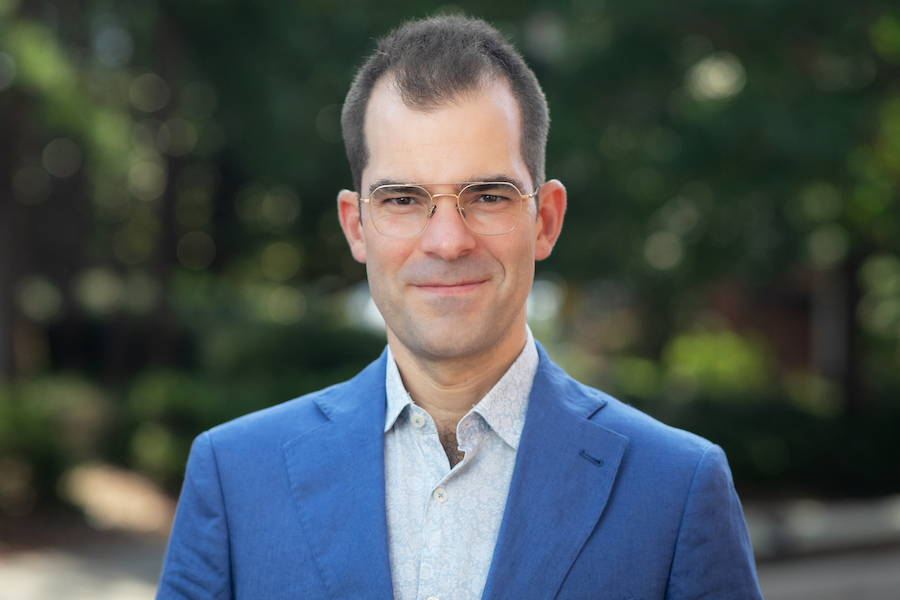Faculty Spotlight: David Newheiser

David Newheiser is an associate professor in Florida State University’s Department of Religion who studies the role of religious traditions in ethical, political and cultural debates. After earning his bachelor’s in philosophy in 2003 from Washington and Lee University in Lexington, Virginia, Newheiser went on to earn a Master of Philosophy in early Christian thought in 2006 from Oxford University in England. In 2012, he earned his doctorate in religion from the University of Chicago, Illinois, and he worked in Australia before joining FSU’s faculty in 2025. In August, Newheiser received a Global Philosophy of Religion project grant, a subgrant of the John Templeton Foundation, for his research project, “Indigenous Spirituality and Human Meaning in the Amazon.”
Tell us a little about your background, where you’re from and what brought you to FSU.
I joined FSU earlier this year because I believe education is for everyone. I spent the last 10 years as a senior research fellow at Australian Catholic University, but I wanted to work at a public university. For democracy to survive, we need citizens who are prepared to think critically and creatively about difficult questions. I love that FSU equips every student — whatever their background — to think for themselves.
Can you break down your research?
I study religion’s place in debates about ethics, politics and culture. My first book, “Hope in a Secular Age,” was published by Cambridge University Press. It argues that religious faith and democratic politics are both sustained by the discipline of hope. I also edited a collection of essays, “The Varieties of Atheism,” that explores the conversation connecting religion and its critics.
I co-edited another collection this year, “Art-Making as Spiritual Practice,” that considers the spiritual dimension of secular art. Across each of these projects, my research draws on medieval Christian thought and modern philosophy to clarify current questions and develop tools to address them.
What makes you passionate about your research?
You can’t understand politics without considering religion. People look to religion for guidance, but religious traditions also inform political concepts that aren’t explicitly religious — such as human rights, social justice and sacrifice. That's why anyone can benefit from studying religion. Since religious traditions are profound and influential, religious studies helps us understand our world, and it offers resources we can use to improve it.
What is important for the public to know about your research?
Careful research is something our society needs. At a time of rising misinformation, institutions like FSU enable scholars to follow the truth wherever it leads, free from interference. Scholarly research also enriches the university’s teaching mission.
Since FSU researchers are working to expand the boundaries of human understanding, we’re better able to teach our students to think for themselves. This is a precious thing we should work to protect!
What is your best memory from working at FSU?
Teaching at FSU is genuinely a joy. On the days when things really sing — when the entire class is locked in, thinking together — I feel deep admiration for my students’ curiosity and courage. Seeing them grow is a beautiful thing, and I’m grateful to be part of it.
What is your favorite part of your job?
I encourage my students to develop their own opinions by reading classic texts, writing about them, and discussing difficult issues in depth. Since my classes focus on complex issues, my students find the work challenging but really rewarding. There’s nothing I enjoy more than seeing them discover the freedom that comes from thinking deeply.
You’re on the advisory board for the project, “Awe-some spirituality: A theological and psychological cross-disciplinary exploration of awe underlying spiritual yearning of the nonreligious,” funded by the John Templeton Foundation. How does this experience contribute to your research at FSU?
This project brings together psychologists, scientists, and scholars of religion from the U.K., Europe and Australia. Serving on this advisory board has deepened my understanding of awe as a type of nonreligious spiritual experience, and it has helped me connect scientific research to theoretical methods in my field. The sciences and humanities have a lot to learn from each other!
Tell us about your upcoming projects.
I’m leading the project “Indigenous Spirituality and Human Meaning in the Amazon” with my longtime collaborator Miguel Farias, associate professor of experimental psychology at Coventry University in England. Our team is working with Indigenous collaborators to study the spiritualities of the Yanomami, Tucano and Tuyuca communities in Amazonia. We're excited to learn from spiritual traditions that are intimately connected to the natural world.
I’m also working on a book about miracles and modern democracy. Many of us feel like we’re caught within economic and technological systems that we can’t understand or control. Whereas this discourages political participation, the study of religion can help expand democratic imagination. Medieval miracle traditions encouraged practices of humility and resilience that made familiar patterns seem suddenly fragile. I think these ancient traditions clarify how democracy works — and how we can help it work better.
If your students only learned one thing from you (of course, hopefully they learn much more than that), what would you hope it to be?
As outlets like Forbes and Business Insider have reported, humanities majors get great jobs. Rather than training for a single career, humanities majors are equipped to succeed at whatever they do.
In religious studies, we teach students to think critically, communicate clearly, and collaborate effectively. Since these are skills that employers value, my students go on to make a good living, but college is about more than money. By teaching my students to think for themselves, I hope they learn habits of freedom and attention that enrich the rest of their lives.
